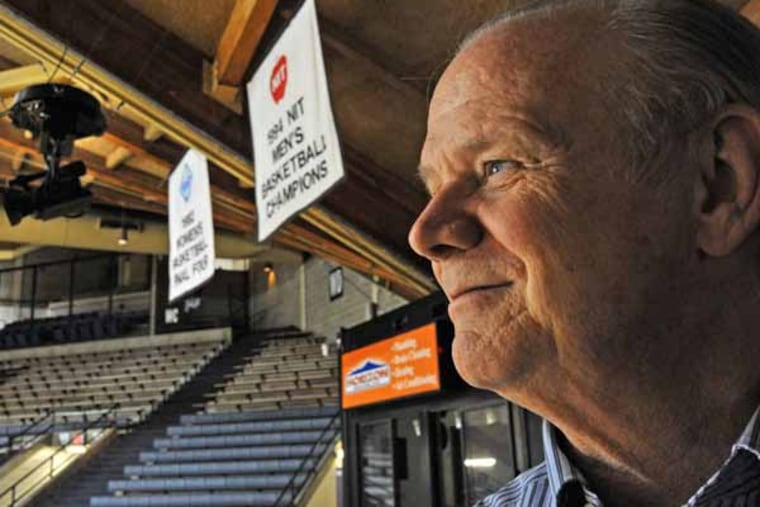His dreams for aerial sports camera fall with economy
Edmond Dougherty had high-flying hopes for the aerial-camera system he helped develop to capture action at school sports events. But those ambitions have landed with a thud.

Edmond Dougherty had high-flying hopes for the aerial-camera system he helped develop to capture action at school sports events. But those ambitions have landed with a thud.
Chalk it up as another recession casualty. Wavecam, brought to life at a workshop in Villanova, took flight in 2008, just as the economy was free-falling and budgets constricted.
"When people were canceling Christmas parties because it wouldn't look right, we were going around saying, 'Hey! Want to buy a flying camera?' " recalled Dougherty, an engineering professor at Villanova University and a chronic inventor.
Thus began a frustrating journey of unrealized sales - followed by a call for help that a Texas company answered.
Last month, Dougherty and 16 fellow investors in Wavecam Media Inc. waved goodbye to their baby, selling it to the Fort Worth owners of Skycam, the robotic camera suspended on cables that soars among the action at more than 100 events a year, primarily for TV broadcast. Many of those are college and pro-football games, including the Super Bowl and Monday Night Football.
Skycam is a product with which Dougherty already had a relationship. The 65-year-old Wayne resident and current president of Ablaze Development Corp. in Villanova, which makes prototypes for other developers, had worked on enhancements to Skycam. (Its creator was another local: cinematographer and Haverford High School graduate Garrett Brown.)
Wavecam is a less-expensive, platform-based system designed for indoor venues such as Villanova's Pavilion, where it has tracked action on the basketball court and provided valuable user data, Dougherty said.
Rather than zooming on cables, Wavecam functions more like a marionette, with the camera dropping down like a spider from a platform that can be raised 100 feet off the ground. It moves along the court or, outside, along the sidelines, but does not crisscross the playing area, as Skycam can.
Of Wavecam's 911 call to Skycam, Dougherty said: "We basically called them up and said, 'Ouch!' "
After Skycam officials visited campuses - including Penn State, the University of Alabama, and Villanova - to see Wavecam in use, "we just came to an agreement," Dougherty said.
Neither he nor Skycam president Nic Salomon would disclose terms of the deal.
"They made an offer to us we probably could have refused, but didn't," Dougherty said. "We thought this was the best chance for this technology to have a good home."
Wavecam's investors exit the deal at a loss. Dougherty would not provide specifics, saying only that "we all lost our shirts, to be honest with you." Some had invested six figures, he said.
How Skycam will use Wavecam has not been determined, said Salomon, who praised its "ease of use and relatively low cost," but noted "a number of drawbacks that need to be evaluated in terms of mobility and performance."
The university market is something "we're certainly interested in," Salomon said. "We'd like to take some time to evaluate that marketplace."
Jamie Hyneman, a special-effects expert and cohost of Discovery Channel's Mythbusters, helped design and build a Wavecam prototype, agreeing to take stock as partial payment, to help keep start-up costs down.
"Unfortunately, they didn't make it," Hyneman said in an e-mail last week. "But I think it was a good product and . . . while one needs to make a profit in a small business, projects like this can be fun to do and rewarding by themselves."
That's the way Dougherty sees it, though he's frustrated that Wavecam failed to gain the traction in the market he had envisioned. Part of his goal was getting its cost low enough that high schools could afford it with little more than a candy sale.
"We were hoping to get it down to $10,000," not counting installation or the camera's price, Dougherty said. Until its sale to Skycam, there had not been a set price for the Wavecam, he said.
"We kept changing how we were doing this," Dougherty said. "At Penn State, Wavecam owned the cameras there and Penn State leased them. At Alabama, we sold it, but Alabama gave us a contract to service them. Villanova was a test site, so we had a synergistic relationship with them."
As part of the sale to Skycam, Dougherty was able to negotiate keeping a few Wavecams for Villanova. As director of the university's engineering entrepreneurship program, he said, he hoped to form a club soon with students trained to operate them.
In addition to collecting fees on Wavecam video, Dougherty said, substantial revenue potential also existed from advertising that could be affixed to its platform.
Ultimately, the aim was "to give the cameras away and work with the universities and high schools on advertising on our marionette platform, and also maybe trying to have a mini-YouTube for sports," he said. "That was our dream."
Until the economy became a killjoy, that is.
"I was just hoping we could outlast the recession - when everyone would love to have flying cameras."
at 215-854-2466 or dmastrull@phillynews.com, or follow on Twitter @mastrud.